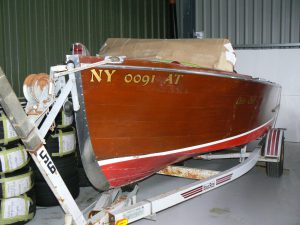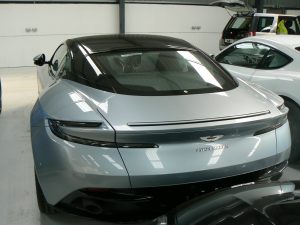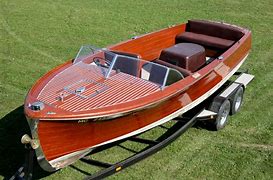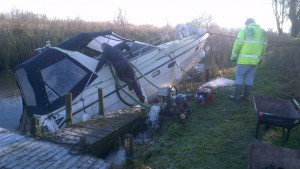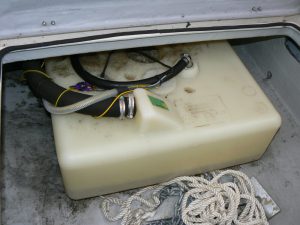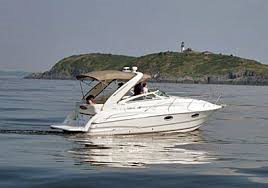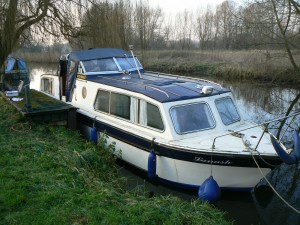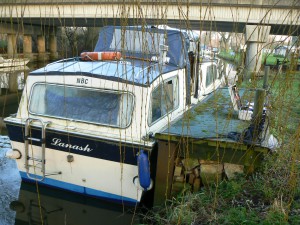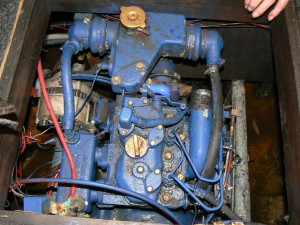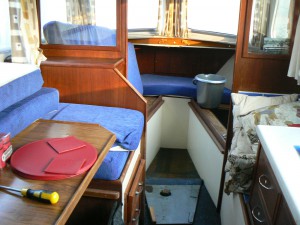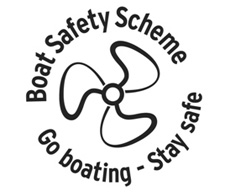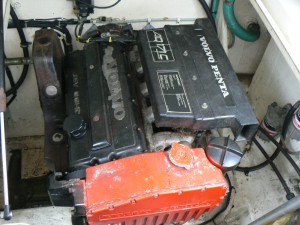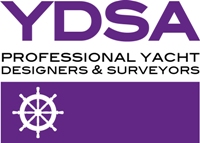Be Prepared for Winter Weather, An ‘El Nino’ event is comingNovember 21, 2018
As meteorologists warn an ‘El Nino’ event is likely to cause widespread snow events and ice storms from early December onwards, European Marine Services is calling for boat owners to prepare for winter weather.
‘El Nino’ occurs when the sea surface temperature in the Pacific Ocean is warmer than average, prompting floods in tropical areas and colder winters in the UK.
Heavy rain, flooding, winds, ice and snow can all cause problems for vessels: they could be swept away, blown off course, take on water, sink or suffer a hull breach. And with nearly one in three of call-outs is due to a lack of general maintenance, we fear ‘neglected’ boats will be put at risk.
Some simple precautions, however, can reduce the likelihood of winter damage. When a weather event does strike, it’s time to get into a routine of visiting the boat regularly and undertake the following;
- Check the batteries are fully charged, with a bilge pump in continuous operation even a fully charged battery will only last a few days.
- Check bilge pumps are fully operational and left on ‘automatic’ setting.
- If there’s no bilge pump or only a manual one is fitted, install an automatic bilge pump – and don’t be complacent; just because it automatically operates, it still needs checking (it relies on battery power so unless the boat’s shore powered, there isn’t an unlimited supply).
- Check drain holes and clear debris – keeping these clear will stop water running into the engine room.
- Check ropes and anchoring points, if the mooring’s at risk of flooding, run a rope to locations that can still be accessed even in a flood situation.
- In windy conditions, check ropes for chafing and ensure they are well positioned and adjusted to the conditions.
- Before moving a boat in ice consider the importance of your journey – it’s easy to believe you’re impregnable when surrounded by steel but even a couple of inches of ice can pierce a hull.
- Check river conditions, and again consider whether the journey is really necessary; river conditions can change quickly and easily catch you unaware. Get updates from the Environment Agency.
- Check the wind direction before manoeuvring. When coupled with difficult river conditions, the windage of a boat can be easily underestimated and your vessel will become uncontrollable.
“If your vessel’s caught in a situation, don’t attempt to recover it without assistance. Severe weather conditions increase the risk to boat owners and simple tasks can easily result in accidents and injury.”
Acknowledgement to Marine Industry News – [email protected].
For more information contact European Marine Services Ltd. Marine Surveyors & Consultants
EMS also undertake Boat Safety Inspections & Engine Inspections
Tel: 01603 327 123
www.europeanmarinesurveys.com
Chris-Craft Sportsman 22 – A Renovation Project #01365March 17, 2018
We recently undertook a Condition Inspection on a 1941 Chris-Craft 22 Sportsman, recently brought into the UK from the USA.
As can be imagined this classic launch is now in need of some renovation but the mahogany construction is basically sound and the Grey Marine 90hp four cylinder petrol engine will require a complete overhaul. The Chris-Craft Sportsman is regarded as the American rival to the Italian Classic Riva and this Sportsman 22 was still being used until quite recently.
When inspected we were surprised and delighted to find this 1941 Chris-Craft to be in very very good company being ‘surrounded’ by literally dozens of new supercars to include Aston Martins, Porsches and Ferraris to name just a few
How about this ………. we’ll leave you to decide the model
Chris-Craft ‘A Potted History’
Chris Smith built his first wooden boat in 1874 at the age of 13.[1] Years later, he built a duck hunting boat. His friends liked the way he built them, and they asked him to build them one. This was technically the start of the boat company. He soon began to build more boats and joined his brother Hank in 1881 to begin producing boats full-time.
In 1910, the brothers joined with other partners to form the Smith Ryan Boat Company.[1] The firm’s name was changed in 1922 to Chris Smith & Sons Boat Company, then to Chris-Craft in 1924. The Detroit-area company became well known for its sleek racing boats in the 1910s and 1920s. Chris-Craft sold high-end powerboats to wealthy patrons such as Henry Ford and William Randolph Hearst.
In the late 1920s, Chris-Craft extended its market into the middle class when it became one of the first mass-producers of civilian pleasure boats. The company began assembly line production at their plant in Algonac, Michigan,[2] dramatically lowering production costs. Formerly, most powerboats had been hand-built. Engines were supplied by both Ford and Chrysler, and by the Hercules Engine Company in later models.[3]
After the war, Chris-Craft introduced a new lineup of civilian pleasure boats in time for the massive American consumer expansion of the 1950s. That decade marked the height of company prestige, and the Chris-Craft brand name became virtually synonymous with pleasure boating. The company offered 159 different models, and it was the sales leader in many categories of small civilian powerboats.
The company sold high-end boats to famous customers such as Dean Martin, Katharine Hepburn, Frank Sinatra, and Elvis Presley. Their boats were often made from the finest mahogany and were considered to be among the best available. They were easy to operate, a must for their “weekend sailor” owners. In some circles, owning a Chris-Craft was considered de rigueur. Even their lower-priced boats were considered to be of high quality, often featuring such luxurious items as a liberal use of mahogany, teak, and brass.
WW2
Chris Smith died in 1939, but his son Jay proved to be an equally able builder of boats and the company continued to flourish. Contributing to the war effort, Chris-Craft built more than 10,000 landing craft. On June 6th, 1944, Chris-Craft LCPLS spearheaded the D-Day landings. To this day, Chris-Craft remains the only recreational boat manufacturer to have its boats tested under fire.
After World War II, Chris-Craft recommenced commercial boat production with renewed vigor. By 1959, Chris-Craft had 10 factories and more than 5,000 employees. Leadership of the company passed to Chris Smith’s grandson, Harsen. When interviewed by Time magazine, he attributed Chris-Craft’s success to the family rather than any individual within it.
Footnote
We have introduced the owner to two local boat building companies we consider capable of undertaking high quality renovation, so hopefully this Classic Chris-Craft 22 Sportsman will remain local
For more information contact European Marine Services Ltd. Marine Surveyors & Consultants
EMS also undertake Boat Safety Inspections & Engine Inspections
www.europeanmarinesurveys.com
Tel: 01603 327 123
Winters’ here – Problems with Water in Fuel TanksNovember 22, 2016
Water gets in to fuel tanks in many different ways, through access ports and filler caps with faulty/damaged seals, tank vent breathers and from external sources such as re-fuelling bulk tanks and containers and Such as above – bad parking
Boat owners do not use their boats in the same way as they use their cars. Many boats are laid up for long periods particularly through the winter months. One of the main causes of fuel related issues is water contamination.
Water contamination is the starting point for bacterial growth, commonly known as ‘diesel bug’ and once in the system it can take some extensive and sometimes expensive work to get rid of it.
Of all the users of diesel fuel the operators of boats are the most likely to encounter problems with water contamination, fungus and bacteria for the following reasons:-
- Boats operate in a wet environment and it is not always possible to stop water seeping into fuel tanks.
- The fuel tanks on boats are designed to fit into restricted or unusually shaped areas to make the best possible use of available space. This can mean that they can be difficult to drain and often have areas where free water can collect and sit undisturbed.
- The fuel tanks contain baffles to stop the fuel sloshing about. The baffles can trap free water in small pockets.
- In warmer climates boats operate in areas with high humidity. Water in the air enters the boat tanks through the breather and condenses inside the tanks.
Where free water is present it will provide a site for fungus and bacteria to grow. Often the fungus or bacteria will develop for a long time without causing any problems until one day they become disturbed and stirred up into the fuel. This will be noticed when filters start blocking with a black slime which is the dead matter from the fungus and bacteria. The fungus can be stirred up by:-
- Vigorous movement due to re-fuelling, waves, rough sea or a storm, etc.
- The fungus population reaches a size at which it grows and spreads into the rest of the fuel.
- The natural life cycle of the fungus reaches a point at which dieback occurs and dead matter floats in the fuel.
- The fungal activity reaches a point at which natural surfactants produced by the fungus cause water and dirt to be suspended in the fuel and the fuel becomes hazy.
PREVENTION:
On land the normal prevention of fungal problems is to regularly drain any water in which the fungus can grow. This may not be possible in most boats because the fuel tank shape does not provide a common draining point for all water pockets. An effective method of removing free water and preventing any build-up of water is to insert an Aqua-Zorb cell in to the tank. These cells will absorb the water and are easily inserted through the filler cap and removed the same way. Aqua-Zorb cells are available in a large range of sizes and are suitable for small tanks and for all sizes of bulk storage tanks.
To prevent water getting in through the tank breather then consider fitting a Des-Case Desiccant Breather, these absorb moisture from the air as it is drawn in to the tank and also absorb moisture when air is expelled from the tank.
Consider regular treatment with a biocide or fuel treatment. The biocide should be one that can be added to the fuel that kills the fungus and stops it growing in the water. An example of effective biocides is Marine 16.
 All products are available from FA-ST Filtration Analysis Services Technology Ltd Tel: 01246268900 or e-mail [email protected] or visit www.fa-st.co.uk for more details or buy on line at www.oilsampling.co.uk
All products are available from FA-ST Filtration Analysis Services Technology Ltd Tel: 01246268900 or e-mail [email protected] or visit www.fa-st.co.uk for more details or buy on line at www.oilsampling.co.uk
FA-ST Ltd is actively looking for more distributors throughout the UK, Europe & Worldwide for their products and services.
For more information contact European Marine Services Ltd. Marine Surveyors & Consultants
EMS also undertake Boat Safety Inspections
Tel : 01603 327 123 www.europeanmarinesurveys.com
Carbon Monoxide on Boats KillsNovember 15, 2016
Each year boaters die or are made seriously ill from carbon monoxide (CO) poisoning. Boats are built to keep water out, but this also makes them good containers for gases and fumes.
We at European Marine Services are constantly promoting & recommending in our Pre Purchase Surveys the installation / fitting of Carbon Monoxide Detectors on all boats with internal propulsion engines
Carbon monoxide is a poisonous gas that has no smell or taste. Breathing it in can make you unwell, and it can kill if you’re exposed to high levels.
Every year in the UK, more than 200 people go to hospital with suspected carbon monoxide poisoning, which leads to around 50 deaths.
After carbon monoxide is breathed in, it enters your bloodstream and mixes with haemoglobin (the part of red blood cells that carry oxygen around your body), to form carboxyhaemoglobin.
When this happens, the blood is no longer able to carry oxygen, and this lack of oxygen causes the body’s cells and tissue to fail and die.
The longer you inhale the gas, the worse your symptoms will be. You may lose balance, vision and memory and, eventually, you may lose consciousness. This can happen within two hours if there’s a lot of carbon monoxide in the air.
The Norfolk Broads
2016 has been a bad year for CO accidents with the two deaths on Wroxham Broad earlier in the summer. Which if a carbon monoxide detector had been installed – this fatal accident may well have been prevented.
NB: This accident was NOT the result of an installed LPG system, but consequent of engine exhaust fumes
Only this month we had another example of exhaust fumes (carbon monoxide) being released by the engine / exhaust hose installation within the living / accommodation space, which release was detected thankfully by a newly installed detector – Nobody was harmed
It is important to note that CO detectors are NOT currently part of the Boat Safety Scheme – Install CO alarm certified to BS EN 50291-2
CO build-up in the cabin can occur with one or a mix of these factors:
- with faulty, badly maintained, or misused appliances
- exhaust fumes from a boat’s engine or generator PLUS perished / faulty / blocked exhaust hosing
- escaped flue gases from solid fuel stoves
- blocked ventilation or short supply of air – fuels need the right amount of oxygen to burn safely
For more information contact European Marine Services Ltd. Marine Surveyors & Consultants
EMS also undertake Boat Safety Inspections
Tel : 01603 327 123 www.europeanmarinesurveys.com
Nirvana 30 (1986) – Insurance Salvage Sale – Worth Buying (#1003)January 28, 2016
On behalf of Haven Knox-Johnson (Amlin) we recently inspected a Nirvana 30 that had sunk at its moorings consequent of vandalism, being now pumped out and now afloat
Due to a low insured value this vessel is a Total Constructive Loss (TCL) and therefore being Offered for Sale as Salvage
The engine is a 2 cyl diesel Kubota ZB750 shaft drive, and the engine has not been removed or inhibited
However, in our opinion this vessel other than (minimal) water damage is very recoverable and would be a commercially viable project
For more information contact European Marine Services Ltd. Marine Surveyors & Consultants
Tel : 01603 327 123 www.europeanmarinesurveys.com
Outboard Engine Storage – Winter 2014 / 15November 7, 2014
OUTBOARD STORAGE – Winter 2014 / 15 FROM MARINEPOWER BRUNDALL
Need somewhere secure and dry?
Don’t want to have to find space at home, work or hide it on the boat?
MarinePower can help!
We can store your outboard here at our marina over the winter in our new outboard storage area, located in our main Office/Workshops building keeping it warm, dry and secure*.
For as little £1 per week we can give you peace of mind and save you the hassle of finding space by securely storing off site, we’ll even cap your storage charge to a maximum of £15 for the winter **.
WINTER OUTBOARD SERVICING
Why not have your outboard serviced while it’s in storage – ready for the new season – and we’ll throw in the Winter Storage free of charge! ***
A typical annual service on 4hp-15hp is around £95-£175 including parts & labour ****.
BOOK TODAY
Reply to [email protected] or call 01603 717525 to book and as an additional offer for early bird bookings we’ll waive any storage fees for outboards received before 1st November.
* Outboards to be dropped off at MarinePower workshop. Additional arrangements can be made to collect if required. Removal/disposal of fuel may incur a charge.
** Winter period considered to be 1st November – 31st March. Weekly rate will apply outside these dates.
*** Winter servicing must be booked in/completed before 28th February to qualify for free storage. Free of charge period only applies to 1st November- 31st March. Weekly rate will apply outside these dates.
**** Assumes normal servicing parts/labour required only. Different makes may incur different parts pricing. Additional parts/labour may be required on inspection.
All prices shown subject to VAT. Further terms and conditions may apply.
Boat Maintenance – 10 TipsNovember 1, 2014
Ten Quick Tips for Winter 2014
As boats are being prepared laid up for winter it is a good time to carry out general maintenance and ensure your yacht is ready for spring 2015.
1. A good clean up is always a good start and you will be surprised by the amount of stuff collected during a summer season and you will probably find things which you thought were lost.
2. Clearing out all the soft furnishings and keeping them in a dry environment to stop them going mouldy. Ensure sufficient ventilation is going throughout the boat.
3. Check that all cockpit drains are cleared
4. Keeping the windows seals / frames clean and clear from moss and growth.
5. Servicing the engine(s) before the yard engineer get too busy in spring time.
6. Fuel Systems – Keeping the fuel tank full or just empty for the winter? Now that is subject to many discussions. If the fuel tank is kept empty over the winter a certain amount of water condensation will appear within the tank. Being heavier than fuel it will sit in the bottom of the tank for the winter time until the next spring refill where it will get mixed with the fuel and eventually makes its way into the engine fuel system. This could be an issue if you haven’t got a fuel / water separator before the main fuel filter. They are easy to fit and very useful.
An other option is to keep the fuel tank full so to minimize the amount of water condensation generated by change of temperatures. The only thing is that fuel quality lowers the longer it is kept. A bit like a ‘sell by date’ and there is a risk of developing ‘fuel bugs’.
Don’t panic, there are many ways available to ‘kill’ those little bugs!
See our blog about ‘Fuel Treatment’ for more details.
So really both concept have their pros & cons and many different opinions can be heard
7. Service your seacocks / packing glands / stern tube whilst the vessel is ashore. They are very often neglected.
8. Make sure the batteries are kept alive during the winter by either having them stored in the yard (if available) on a charging bench or by keeping them on trickle charge either on board or in a shed.
9. Plan the maintenance / work schedule ahead so you don’t have to rush through it comes spring.
10. Check with your insurance company when you are due for a renewal. This would be a good time to carry out an insurance survey whilst the vessel is winterized and/or ashore. It will save you having to lift it out a second time during the summer time. And gives you peace of mind for the coming season. Give us a call for a competitive quote.
Wishing you all a warm winter season with no problems
For more information contact European Marine Services Ltd (inc European Marine Surveys) Tel : 01603 327 123 www.europeanmarinesurveys.com
LPG Gas Safety – Urgent NoticesOctober 15, 2014
 Urgent Safety Notices Concerning Gas Equipment
Urgent Safety Notices Concerning Gas Equipment
Recall of Calor Lite® cylinders 2008-11
Calor Gas Ltd has asked the BSS to help notify boaters that there is an immediate product recall on all 6kg Calor Lite® cylinders manufactured between 2008-2011 inclusive following concerns regarding the potential deterioration of the cylinder. Find out more here immediate recall information
Do you have a Beko, Flavel or Leisure LPG cooker installed on your boat?
Beko UK has an urgent safety notice and has asked for support from the Boat Safety Scheme.
There is an on-going Beko campaign to find and fix dangerous older models of Beko, Flavel and Leisure gas cookers that can produce potentially fatal levels of carbon monoxide, if used incorrectly with the grill door closed. Find out more here: Urgent Safety Alert
Boats with LPG (butane and propane) aboard
If your vessel has gas aboard, please remember to prepare the vessel before its examination and ensure there is a supply of gas ready for the examiner to undertake the checks.
LPG cylinder lockers – boat owners must ensure the BSS Examiner can carry out careful checking of the LPG cylinder locker for condition, including the removal of all loose portable items, base protection mats, removable false floors and the temporary removal of connected LPG cylinders.
Discuss your LPG cylinder locker arrangements with your examiner in advance of the examination as this may require your attendance or you to make prior arrangements involving service agents.
LPG lockers not accessible enough to allow an assessment of condition will involve the BSS Examiner having to return to carry out the check with the obstruction removed.
The BSS Examination includes checks on any LPG system covering aspects of the storage of gas cylinders, gas system and the connections to gas appliances.
The complete set of checks can be read in Chapter 7 of the BSS Examination Checking Procedures (See page 40 of the PDF file).
Here is a diagramtic description of the BSS requirements linked to a boats LPG system. The numbers refer to the chapters and section in the BSS ECPs refered to in the link above.
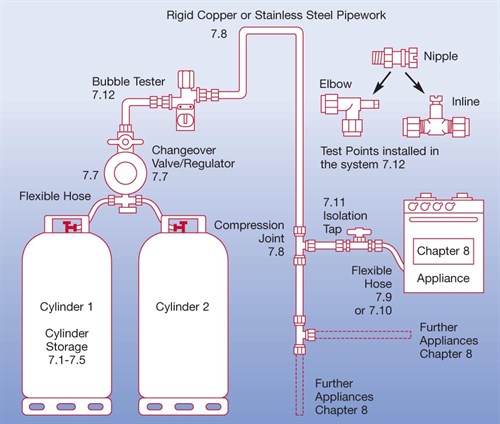
How do we check your boat is free from gas leaks?
The BSS examination includes a test that checks that the gas system is free from leaks i.e the gas tightness-test.
However, we would like to stress that the system should be gas-tight (not leaking) all times, not just when the BSS examination is due.
For boat owners the simplest way of having that assurance is to install a bubble tester and use it routinely. The examiner can also use this device to check the system is gas tight too, if it is installed correctly.
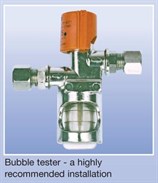 |
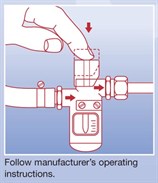 |
Where a bubble tester isn’t fitted, the BSS Examiner must use a device called a manometer, this has to be connected to a gas test point.
The test point is simply a threaded opening into the gas system. It is sealed by a screw action nipple. To test the system, the nipple is undone, the manometer is connected up, the test is carried out, the manometer is then disconnected and the nipple is tightened back down. It is tightened sufficiently to seal the test point once more to prevent a gas leak, but not so tight as to damage the seal and cause a gas leak.
For more information contact European Marine Services Ltd. Marine Surveyors & Consultants
EMS also undertake Boat Safety Inspections & Engine Inspections
www.europeanmarinesurveys.com
Tel: 01603 327 123
Marine Engine Oil Analysis | What is it | BenefitsJune 16, 2014
Marine Engine Oil Analysis – Recommended at time of Pre Purchase Inspection
Engine Oil Analysis – To be recommended at time of a Pre Purchase Survey, certainly on all motor boats where the engine is more than about ~ 10-15 years of age (and/or) where the hours are quite high (and/or) where there is no complete service record
To protect yourself from potentially expensive repairs why not get an engine health check at the same time as the pre purchase survey inspection.
Remember without an engine your boat goes no where
Engineering & Oil Inspections – Marine Oil Analysis carried out to ISO 9001: 2008 standards
Engine(s) visual ONLY inspections are carried out on yachts and power boats
As surveyors (not technical engineers) we visually inspect marine engines and generator installations during our inspections, and where possible the engine is run up to access its general running characteristics, vibration levels etc. No dismantling of the engine or associated equipment is carried out within the scope of a condition survey so no detailed comment upon the internal parts is possible.
As we are unable to comment on the internal condition of the engine(s). It is therefore always strongly recommended that the engines(s) are examined and further tested by a competent marine engineer familiar with the make and type of machinery installed.
On larger power vessels the engine represents a large part of the vessels value and is fundamental to safety. The above visual examinations will be carried out where possible but we will probably recommend a full engine trial to put the engine(s) through their paces.
On most engines, oil analysis may be a worth while investment as it can tell a trained marine engineer a lot about the engines internal condition.
Fee £ 95.00 inc per engine sample analysis (less £15 if undertaken at same time as vessel inspection)
It represents very good value compared with the cost of rectifying damaged engines.
Oil Analysis is one of the most useful and important maintenance support programs available.
- Detects problems early, so actions can be taken before they become major failures.
- Helps schedule downtime to fit the workload.
- Monitors positives as well as negatives, so you won’t have to pay for repair of components that are not worn out.
- Allows you to monitor maintenance schedules to verify that routine maintenance has been performed.
- Enables you to better manage budgets by predicting repairs, downtime, and equipment life.
- Helps you develop a complete service history for each machine. This proves invaluable when evaluating performance and planning replacement purchases.
- Documents service history for a higher price at trade-in or sale.
For maximum protection, you need oil sampling for all major oil lubricated systems (engine, transmission, hydraulic system and final drives) and coolant sampling for your cooling systems. By pinpointing trouble early, you can avoid unplanned repairs or catastrophic failures.
Our Marine Engine Oil Analysis Laboratory operates to ISO 9001:2008 standards and meets all manufacturer warranty requirements. The Laboratory can provide analysis for all types of synthetic, mineral & bio-degradable oils ,engine oils, gas engine oils, hydraulic oils, transmission oils, gear oils, transformer oils, coolants, grease, cutting fluids, water based oils, glycols emulsions, diesel fuel, fuel and biodiesel etc.
For more detailed information on Oil Analysis Samples Visit
For more information contact European Marine Services Ltd. Marine Surveyors & Consultants
EMS also undertake Boat Safety Inspections & Engine Inspections
www.europeanmarinesurveys.com
Tel: 01603 327 123
OIL SPY – Pre Season PreparationMarch 26, 2014
Marine Surveyor – Recommendations
Hi There – Boat Owners
In this blog European Marine Surveys are offering advice for Pre-Season Preparation
OIL SPY
Ideal pocket – toolbox tool for immediate results. For all marine enthusiasts whether commercial users, hire fleet operators, private boat owners …..in fact any powered vessel. Most owners know their engines and our OILSPY test will help you to fully understand what is going on internally in your engine.
This is not a replacement for laboratory oil analysis but an additional tool for instant ‘on site’ visual results. Advance notification of any oil deterioratiobn is a certain method of safeguarding your engines from any possibility of component or lubrication breakdown/failure.
If you are thinking of buying or selling a boat then an instant test can give you a good indication of oil condition and will help in identifying coolant leaks, fuel dilution, oxidation, sediment, sludge formation and wear debris. Each boxed kit contains 20 test cards. Consider taking your boat for an engine service……take a test before and after……..was the engine flushed and the oil changed….OILSPY can tell you. Buying a used boat…take a test run, take the OILSPY test……you only need a drop of warm oil from the dipstick to give you peace of mind on engine condition
Oil Spy – For less than £ 26.00 per box (plus P&P) of 20 test cards
For more information contact European Marine Services Ltd (inc European Marine Surveys) 01603 327 123 end_of_the_skype_highlighting www.europeanmarinesurveys.com




